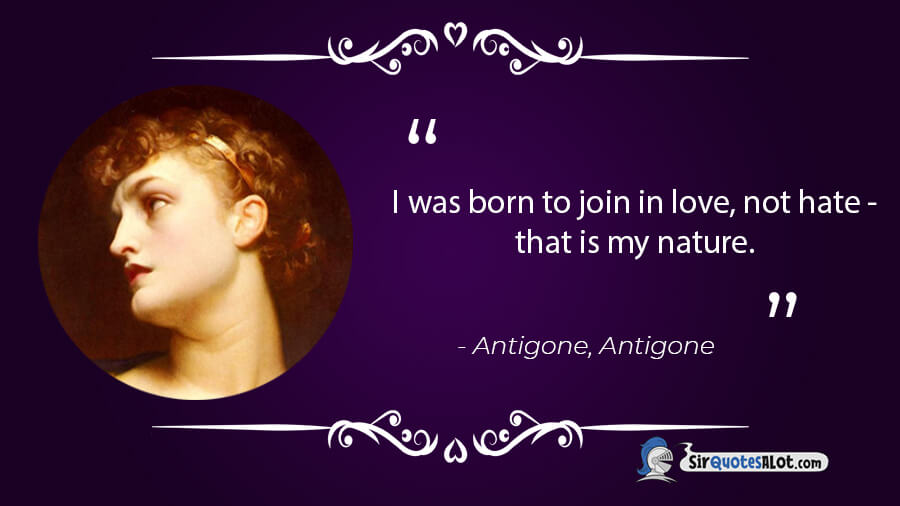Antigone is a tragedy play that was written around 441 BC by Sophocles. The play is made of episodes that include both dance and song. It is the third in order of the three Theban plays. In this article, I will share the most memorable and important Antigone quotes.
Prior to the beginning of the play, the brothers Eteocles and Polynices, leading opposite sides in Thebes’ civil war, died fighting each other for the throne. Creon, the new ruler of Thebes and brother of the former Queen Jocasta, has decided that Eteocles will be honored and Polynices will be in public shame. The rebel brother’s body will not be sanctified by holy rites and will lie unburied on the battlefield, prey for carrion animals like vultures and jackals, the harshest punishment at the time. Antigone and Ismene are the sisters of the dead Polynices and Eteocles.
Here are some of the main characters in the play:
Antigone – A female protagonist returning to Thebes in order to bury her brother.
Eteocles – The dead brother of Antigone who is hailed as a hero.
Polyneices – The dead brother of Antigone who is hailed as a traitor and so he cannot be buried in a proper way.
Ismene – The young sister of Antigone.
Creon – King of Thebes and also the uncle of Antigone. In the play he is the antagonist.
Haemon – Son of Creon and also Antigone’s fiancé.
Teiresias – The prophet of Thebes.
Chorus – The citizens of Thebes
Sentry – A guard watching the body of Polyneices and also the man who arrests Antigone.
Antigone Quotes
Antigone: No man shall say that I betrayed a brother.
Antigone: Say I am mad and give my madness rein to wreck itself; the worst that can befall Is but to die an honorable death.
Antigone: No youths have sung the marriage song for me, my bridal bed No maids have strewn with flowers from the lea, ‘tis Death I wed.
Antigone: Yea, for these laws were not ordained of Zeus, and she who sits enthroned with gods below, Justice, enacted not these human laws. Nor did I deem that thou, a mortal man, Could’st by a breath annul and override The immutable unwritten laws of Heaven.
Antigone: To reverence kith and kin can bring no shame.
Antigone: I was born to join in love, not hate – that is my nature.
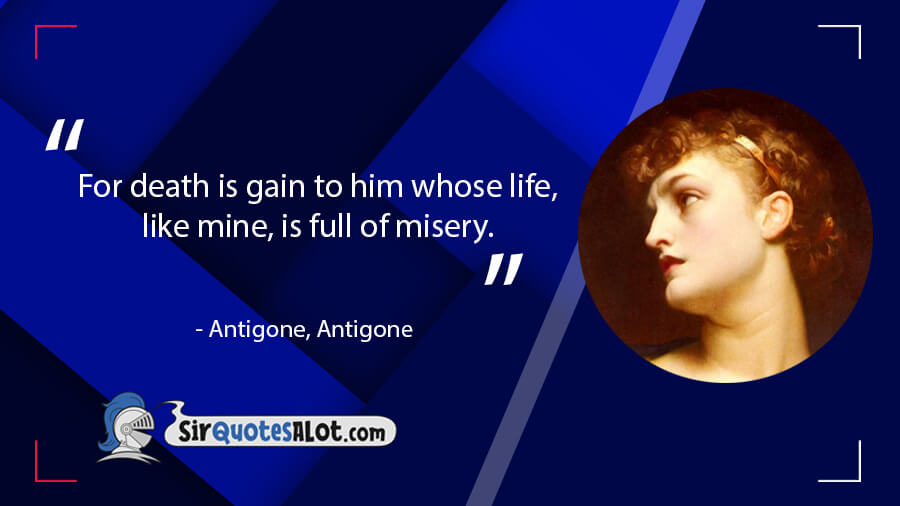
Antigone: For death is gain to him whose life, like mine, is full of misery.
Antigone: It is the dead, not the living, who make the longest demands.
Antigone: And even if I die in the act, that death will be a glory. I will lie with the one I love and loved by him.
Antigone: We have only a little time to please the living. But all eternity to love the dead.
Antigone: I have no love for a friend who loves in words alone.
Antigone: Dear god, shout it from the rooftops. I’ll hate you all the more for silence—tell the world!
Antigone: Like father, like daughter, passionate, wild . . . she hasn’t learned to bend before adversity.
Antigone: Say I am mad and give my madness rein to wreck itself; the worst that can befall Is but to die an honorable death.
Antigone: For death is gain to him whose life, like mine, Is full of misery.
Antigone: And if I have to die for this pure crime, I am content, for I shall rest beside him. His love will answer mine.
Antigone: O look upon me, the last that remain of a line of kings! How savagely impious men use me, for keeping a law that is holy.
Antigone Haemon Quotes
Haemon: A State for one man is no State at all.
Haemon: Go, consort with friends who like a madman for their mate.
Haemon: For whoso thinks that wisdom dwells with him, that he alone can speak or think aright, Such oracles are empty breath when tried.
Haemon: A man, though wise, should never be ashamed of learning more, and must unbend his mind.
Haemon: It is not right if I am wrong. But if I am young, and right, what does my age matter?
Haemon: A city which belongs to just one man is no true city.
Haemon: Whenever a man supposes that he alone has intelligence or expression or feeling, he exposes himself and shows his emptiness.
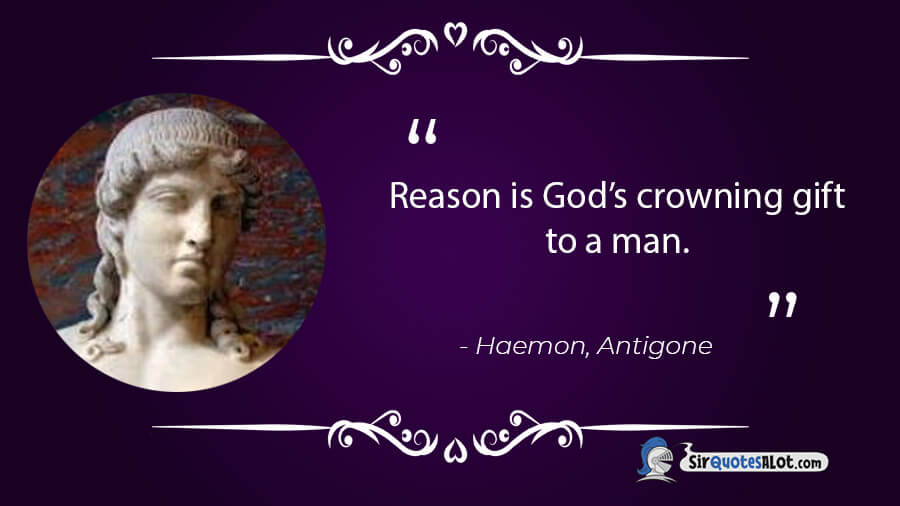
Haemon: Reason is God’s crowning gift to a man.
Antigone Ismene Quotes
Ismene: When misfortune comes, the wisest even lose their mother wit.
Ismene: Go then if you must, but remember, no matter how foolish your deeds, those who love you will love you still.
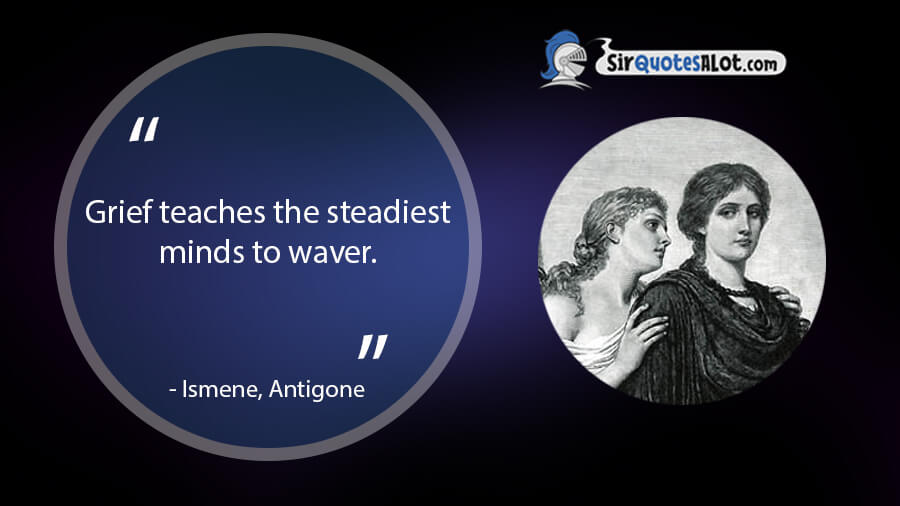
Ismene: Grief teaches the steadiest minds to waver.
Antigone Creon Quotes
Creon: More hateful still the miscreant who seeks When caught, to make a virtue of a crime.
Creon: I contemn the man who sets his friend Before his country.
Creon: Of evils current upon earth The worst is money. Money ‘tis that sacks Cities, and drives men forth from hearth and home; Warps and seduces native innocence, and breeds a habit of dishonesty.
Creon: What evils are not wrought by Anarchy! She ruins States, and overthrows the home, she dissipates and routs the embattled host; While discipline preserves the ordered ranks.
Creon: Die then, and love the dead if thou must; No woman shall be the master while I live.
Creon: God moves swiftly to cancel the folly of stubborn men.
Creon: There’s nothing in the world so demoralizing as money.
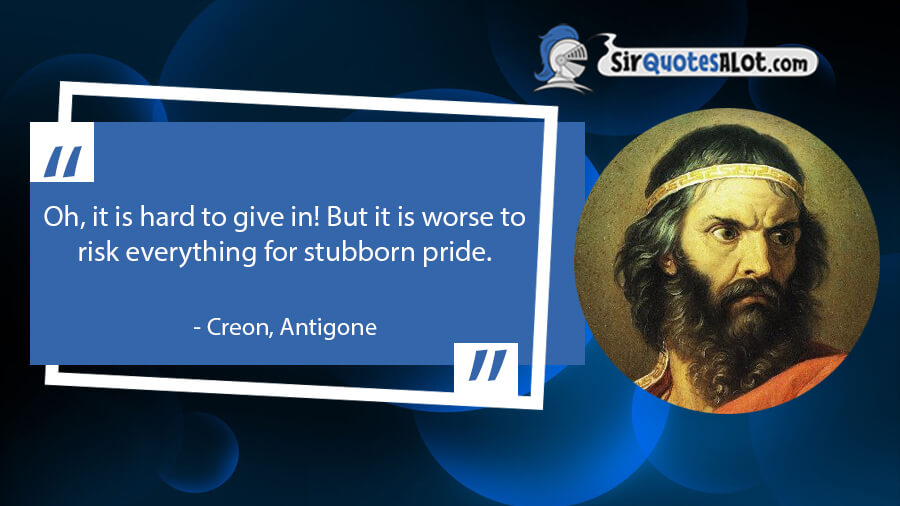
Creon: Oh, it is hard to give in! But it is worse to risk everything for stubborn pride.
Creon: There is no art that teaches us to know/ The temper, mind or spirit of any man/ Until he has been proved by government/ And lawgiving.
Antigone Guard Quotes
Guard: For ‘tis most sweet to ‘scape oneself scot-free, and yet to bring disaster to a friend is grievous.
Guard: Alas! how sad when reasoners reason wrong.
Antigone Teiresias Quotes
Teiresias: To err is common to all men, but the man who having erred Hugs not his errors, but repents and seeks The cure, is not a wastrel nor unwise.
Teiresias: …all men make mistakes, but a good man yields when he knows his course is wrong, and repairs the evil. The only crime is pride.
Antigone The Chorus Quotes
The Chorus: Strained silence, so I deem, Is no less ominous than excessive grief.
The Chorus: No man is mad enough to court his death.
The Chorus: Welcome, light of the sun, the fairest sun that ever has dawned upon. Thebes, the city of seven gates!
The Chorus: Disaster is linked with disaster. Woe again must each generation inherit.
The Chorus: Too late, too late you see the path of wisdom.
The Chorus: Then pray no more from suffering that has been. Decreed no man will ever find escape.
Antigone Summary
During the Theban civil war, two brothers Polynices and Eteocles die while fighting each other to win the throne of Thebes. Creon, who is the new ruler of Thebes declares that Eteocles will be honoured while Polynices is disgraced. As a result, Polynices’ body should remain on the battlefield, unburied, which was at the time a shameful and harsh form of punishment.
Antigone decides that she will bury her brother no matter what, even though Ismene, who is her sister, refuses to help her in this task of fear she will receive the death penalty. During the play, a sentry enters in order to report that Antigone indeed has buried Polynices despite Creon’s declarations to leave his body unburied.
Antigone argues with Creon about the morality of his edict and her actions and deeds. Ismene is also brought for interrogation, falsely trying to state that she has helped as well, wanting to die along with her sister. Antigone, takes all responsibility of the actions and the blame on herself.
Creon decides that as a result for Antigone’s actions, she will be buried alive in a cave, while Ismene’s life is spared. Tiresias, the blind prophet, warns Creon that the Gods favour Antigone and are on her side, and that Creon may lose a child for the harsh punishment he set on Antigone, as well on his refusal to burry Polynices, which can be looked on as a crime on itself. On top of that, the prophet tells him that all of Greece and its citizens will despise him for his decision and that even sacrificial offerings won’t be enough or accepted by the Gods. The prophet does not convince Creon who simply dismisses him, claiming he’s an old fool and corrupt.
Chorus is terrified of the situation and of what may occur, so they beg Creon to reconsider again his decisions. Eventually, Creon decides to free Antigone and allow to bury her brother Polynices. At this moment, Creon is fearing himself of the prophet’s warnings, and so he tries to make things rights and amend his mistakes.
When all seems to go the right way, a messenger enters to deliver that in desperation, both Antigone and Haemon have committed suicide. Creon’s wife is heart-broken of the loss of her child and Creon begins to comprehend that he is responsible for what had occurred. Then, another messenger enters and delivers that Eurydice has also committed suicide and with her last breath and last words had cursed her husband.
Creon is now devastated and a broken man, understands that all of these happened due to his actions, even though he tried to follow and protect the law, only it was against the Gods and their will. As a result, he had lost both his wife and son.
For more famous quotes from literature, we invite you to browse our articles featuring the very best Sylvia Plath quotes and Emily Dickinson quotes.

